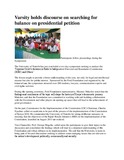| dc.description.abstract | The University of Nairobi concluded a two-day symposium seeking to analyse the ‘Supreme Court’s decision in Raila vs Independent Electoral and Boundaries Commission (IEBC) and Others.’
The forum sought to provide a better understanding of the case, not only for legal and intellectual reasons but also for public interest. Sponsored by the Ford Foundation and organized by the School of Law, the symposium attracted over 200 students, lawyers, communication experts and civil rights activists.
During the opening ceremony, Ford Foundation representative, Maurice Makoloo noted that the findings and conclusions of the topic will shape the history of Kenya’s democratic journey. Makoloo said that the Foundation was committed to working with and building collaboration with the Government and other players in opening up space that will lead to the achievement of good governance.
On his part, Commission for the Implementation of the Constitution (CIC) Chairman, Charles Nyachae called on academia to be part of the process of the implementation of the Constitution of Kenya 2010. He commended the University of Nairobi for taking deliberate measures in ensuring that the objectives of the Rapid Results Initiative (RRI) on the implementation of the Constitution, launched in August 2013 are realized.
Vice-Chancellor, Prof. George Magoha, called upon the participants to give their input on the discussion and consolidate the findings which will lead to a deepened understanding of the Constitution and robust debates on its implementation. He said that the University is keen in being part of focused discussions seeking to address some emerging issues that are relevant to the nation’s development politically, economically and socially.
The papers, presented by different scholars and professionals, examined various aspects and processes that were the focus of questioning, during the petition and included: the vitality of presidential elections and the roles of the IEBC, the executive and parliament. Other presentations touched on media technology and the civil society in the process of electioneering. An interesting paper was that on the role of language in regards to the Supreme Court ruling. In addition, Prof. Kwasi H. Prempeh, a constitutional scholar from Ghana, shared Ghana’s experience following two presidential election petitions in the country and discussed issues surrounding technology, time frames and constitutional provisions which were explored incisively in the petitions.
The proceedings of the symposium will be developed into a print and electronic publication titled Searching for Balance: Reflections on Kenya’s Presidential Election of 2013 available to the public. | en_US |

